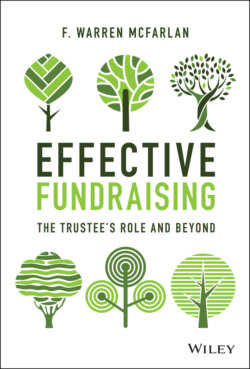Читать книгу Effective Fundraising - F. Warren McFarlan - Страница 12
How to Get Started
ОглавлениеHow to get started as a new trustee or solicitor in your philanthropic activities? The first thing a new social enterprise trustee or solicitor who is beginning on the path of philanthropic engagement must do is to take the time to truly internalize the mission of the organization in all its nuances. Until you can accurately and passionately describe its mission, you cannot sell it. In my previous book, Joining a Nonprofit Board: What You Need to Know,2 the entire book was devoted to mission and the boards' role in developing and executing it. The second thing that the trustee and donor must do commensurate with one's personal resources is to aggressively support the organization (translation: write a personal check large enough that it hurts). Nothing gives you more credibility in selling an organization's mission and needs to future donors than the fact that you are personally supporting it in a meaningful way. When you are talking about your gift and how you thought about it, you add a priceless note of authenticity to your pitch. A neighbor of the author, when taking over her church's annual stewardship campaign, looked carefully at her previous years' donations and made a stretch gift from her perspective. In the ensuing months, the making of this gift gave an underlying passion to her presentations (both public and one-on-one) which rang with the authenticity of the true believer. This passion was critical to the campaign's ultimate success. Enthusiasm and passion are vital tools in the fundraising tool kit. A good fundraiser has many of the attributes of an evangelist.
A recent leader of a hospital's capital campaign shows the importance of donor longitudinal engagement. Twenty years ago, the individual had been chair of the hospital's board. After serving his term and making a significant seven-digit-figure gift to the hospital's first capital campaign, he had remained involved with the hospital as a corporator and then as its liaison to another medical organization. He also continued being a patient of the hospital, using many of its doctors over the years. As a fundraiser, the 20-plus years of experience and involvement with the hospital underscored his deep commitment, which came through in the various solicitation calls and visits he made for the current campaign (including his self-solicitation) to which, as a campaign co-chair, he had first pledged generously.
What the preceding example shows is that a trustee's fundraising skills can be valuable to an organization long after the trustee's term has expired. Former trustees properly engaged are real assets as solicitors in campaigns ranging from those of bricks and mortar to planned giving. Preparation for this role begins when one first becomes engaged as a solicitor and is then successively nurtured and deepened over the years of one's service in many ways. When you recruit trustees, you are engaging their services for the organization not just for their terms as a trustee but also for a very long period of time during which the individual will pass through many roles with the organization beyond that of trustee. Their historical memory of past donors and prior campaign issues, plus their deep commitment, provides invaluable context for today's and tomorrow's campaigns.
Practice makes perfect. The more times someone asks for money, the better they get at it. Additionally, of course, asking a person for support with whom you have developed trust over time yields especially good results. Consequently, matching the right solicitor to the right potential donor is key. Finding matches where mutual respect, common interests, and common history already exist is a good way to get started. Of course, brainstorming with the organization's officers and staff combined with good research in advance of a visit helps in getting an initial dialogue started. A shared hobby, children's common college, a common sport interest, and so forth are all things used to get the conversational ball rolling. As rapport is established, the conversation then naturally moves to the issue at hand. Multiple visits over many years are sometimes required to secure a major pledge. In one case the author is familiar with, it required 50 visits over a decade to secure a $50 million gift. The CEO made so many calls to the donor and other donors in the city where the donor was located that the CEO finally got an apartment there to cut down on travel/living costs. In this context, it should be noted that continuity in connecting potential donors to their previous solicitors can really help. This is also why turnover in an organization's major gift officers can cause real problems as important history and relationships can be lost.
